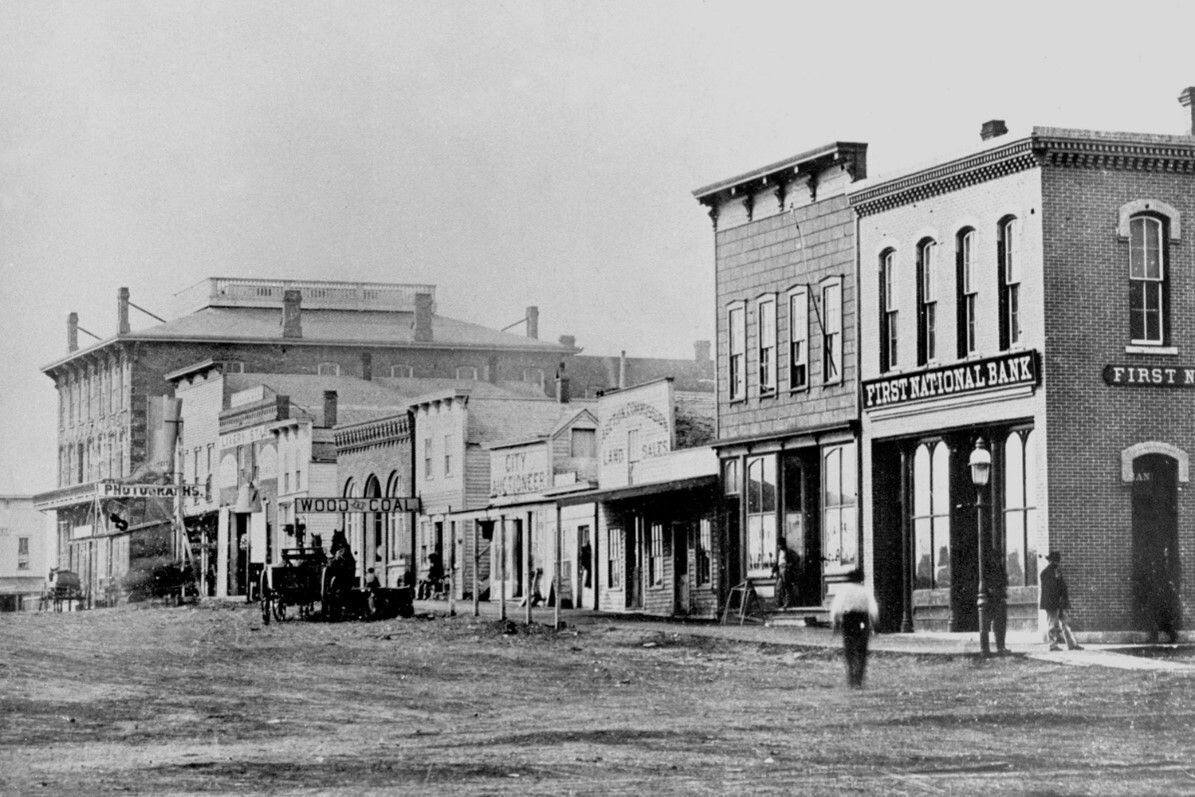-
1857 - Nebraska Territory
Turner Marquett began practicing law in Plattsmouth, Nebraska Territory in 1857. He quickly achieved prominence at the Bar and in territorial politics- drafting and sponsoring the first bill to abolish slavery in the territory and serving as an original commissioner of the Union Pacific Railroad & Telegraph Company.
-
1867 - Nebraska's First Official Acts in the Union
In 1866, firm founder Turner Marquett defeated J. Sterling Morton in a controversial election for Nebraska's provisional seat in Congress. By the time Congress overrode President Andrew Johnson's veto of Nebraska's admission to the Union, only two days remained of the Congressional term. Nebraska's two senators declined to take their seats for fear of shortening their terms, but Marquett accepted his seat as Nebraska's first member of the United States House of Representatives. On March 2nd, 1867, Marquett performed Nebraska's first official act in the Union by taking his oath of office and voting to override President Johnson's veto of the Reconstruction Act.
-
1871 - Partnership in Lincoln
In 1871, Turner Marquett and General Amasa Cobb, a veteran of both the Mexican War and the Civil War, formed the partnership of Cobb & Marquett in Lincoln, the state capital. The firm served as counsel for the Burlington Railroad and the First National Bank of Lincoln, which was founded and federally chartered by Cobb. During this period, Marquett also defended the impeachment trial of Nebraska's first governor, David Butler.
-
1880s - A Time of Growth
After Amasa Cobb was appointed to the first vacancy on the Nebraska Supreme Court in 1878, Turner Marquett formed a partnership with Frank M. Hall and Joel Deweese. Marquett, Deweese & Hall's work for the Burlington Railroad, the First National Bank of Lincoln, and the Lincoln Land Company contributed much to the economic development of Nebraska during the 1880s and early 1890s. Towns on the Burlington line were named after both Marquett and Deweese.
-
Celebrated Contemporaries
Establishing well-known reputations in their own right, Marquett, Deweese & Hall also shared an office building with several soon-to-be-famous contemporaries: William Jennings Bryan, later a three-time Presidential nominee; Charles Dawes, Vice-President of the United States under Calvin Coolidge; and Roscoe Pound, a future member of the firm and one of America's most noteworthy legal scholars.
-
1895 - Ushering in a New Age
With Marquett's death in 1894, Frank Hall was joined by Genio Lambertson. As United States Attorney for the District of Nebraska, Lambertson represented the United States in two seminal Native American rights cases, Standing Bear and Elk v. Wilkins. Lambertson also served as the First Assistant Secretary of the Treasury and as the attorney to the newly created Interstate Commerce Commission. While with the firm, Lambertson was the attorney to the receivers of the bankrupt Union Pacific Railroad when it was sold to E. H. Harriman in 1897 at public auction in Omaha.
-
Early Twentieth Century
After Genio Lambertson died in 1902, Frank Hall's reputation and practice attracted two of Lincoln's most promising lawyers: Frank H. Woods, who had founded the Lincoln Telephone Company, and Roscoe Pound, dean of the University of Nebraska School Of Law. In 1906, Pound delivered his famous speech to the American Bar Association in Chicago, "The Causes of Popular Dissatisfaction with the Administration of Justice", which ignited a spark of legal reform and catapulted him into national prominence culminating in his service as dean of the Harvard Law School from 1916 to 1936. During Frank Woods' tenure with the firm, he negotiated a historic agreement between the independent telephone companies and the Bell System, which furnished national toll services to all exchanges.
-
Frank M. Hall
Frank Hall practiced law with the firm until his death in 1928. Hall's preeminence as a railroad, business, and banking lawyer was matched by his reputation as a public servant and benefactor of the first order. He served as President of the Lincoln School Board, President of the Nebraska Bar Association, and contributed much to the cultural development of Lincoln. Hall was the driving force behind the selection of sculptor Daniel Chester French and architect Henry Bacon to design the statue of Abraham Lincoln erected on the grounds of the Nebraska State Capitol in 1912. Two years later, Congress selected Bacon and French to design the Lincoln Memorial in Washington D.C. Upon his death in 1928, Hall left his extensive art collection and a large monetary bequest to the University of Nebraska. The art formed the nucleus of the Sheldon Art Museum's original collection and the endowment continues to support the Sheldon to this day.
-
Post-World War I Era
Frank Williams joined Frank Hall's practice after he returned from World War I. Earl Cline, who was severely wounded during the war, joined the practice in 1922. The firm of Hall, Cline & Williams participated in the subtle but important changes taking place in the nature of trial work. Cline was one of Nebraska's leading trial lawyers and served as a Regent and counsel to the University of Nebraska. Williams served on the Board of Directors of the First National Bank of Lincoln for forty years and expanded the firm's corporate, banking and trust, and estate practice. After Frank Hall died in 1928, the firm retained his name until 1941 when Flavel A. Wright became a partner.
-
Post-World War II Era
Flavel Wright left the practice in 1942 to serve as a naval officer. Aboard the aircraft carrier USS Bunker Hill, he participated in several of the major naval battles of the Pacific Theater and narrowly escaped death when two Japanese kamikaze planes struck the ship off the coast of Okinawa in May of 1945. Wright returned to the firm after the war. Two other veterans joined the firm- Warren C. "Bud" Johnson and Charles E. Oldfather. Wright was a renowned trial lawyer. Johnson was a leading banking, corporate and securities lawyer, and Oldfather was a preeminent trusts and estates lawyer.
-
Last Half of the Twentieth Century
From the 1950s through the end of the twentieth century, Cline Williams grew from six lawyers to over forty lawyers. The firm, which opened its Omaha office in 1988, continued to expand its trial practice, strengthen its innovative work for long-time business and institutional clients, and establish its preeminence in the area of trusts and estates.
-
Poised for the Future
Today, the firm has offices in Lincoln, Omaha, and Aurora, Nebraska, as well as offices in Fort Collins and Holyoke, Colorado.
SEARCH



